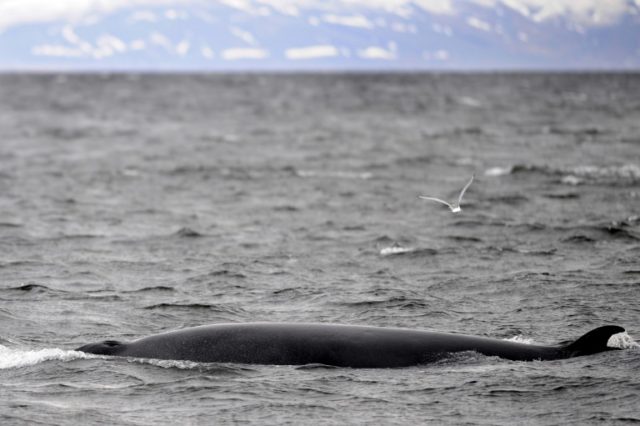Reykjavik (AFP) – Iceland has set new quotas for its controversial minke and fin whale hunt for the next five years despite declining profits recently, a decision bound to anger environmentalists.
Fisheries and Agriculture Minister Kristjan Thor Juliusson said late Tuesday whalers would be authorised to harpoon 209 fin whales and 217 minke whales annually until 2023, stressing the numbers were sustainable.
The government said the decision was based on recommendations from Iceland’s Marine Research Institute and a January 15 report from the University of Iceland on the macro-economic impact of whaling.
“We are determined to make use of our natural resources in a sustainable fashion, based on scientific opinion,” Juliusson told state broadcaster RUV.
“These quotas are based on scientific research. They are sustainable, they are monitored, and they’re in line with international law.”
The government said in a statement that the number of fin whales has increased steadily since 1987.
“During the most recent count in 2015, their population in the Central-North Atlantic was estimated at 37,000, or triple the number from 1987,” it said.
Last year, the only Icelandic company that hunts fin whales, Hvalur hf., harpooned 144 animals after a two-year hiatus due to commercial difficulties over declining consumption in Japan, its biggest market.
IP-Utgerd Ltd., which hunts minke whales, cut short its whale hunt at the end of July because it wasn’t profitable, after killing just six whales out of a quota of 262, the smallest number since Iceland resumed whaling in 2003.
Whalers had to travel further than usual from the coast to find whales, which increases costs.
Iceland, along with Norway, openly defies the International Whaling Commission’s 1986 ban on whale hunting.
The practice has drawn fire from numerous corners including the European Union and the United States, which in 2014 threatened Iceland with economic sanctions.
Japan also hunts whales, but uses a legal loophole that allows it to continue catching the animals in order to gather scientific data.
The Icelandic political party the Left-Green Movement — the party of Prime Minister Katrin Jakobsdottir — in October reiterated its opposition to the whale hunt.
“There are diverging opinions on the matter,” Juliusson acknowledged.
The University of Iceland report concluded that whaling was profitable for the country, bringing in 1.41 billion kronur (10.4 million euros, $11.8 million) per year between 2009 and 2017.
Whale watching meanwhile brought in 3.2 billion kronur in 2017, it said.
Iceland’s whaling season usually opens in June.

COMMENTS
Please let us know if you're having issues with commenting.